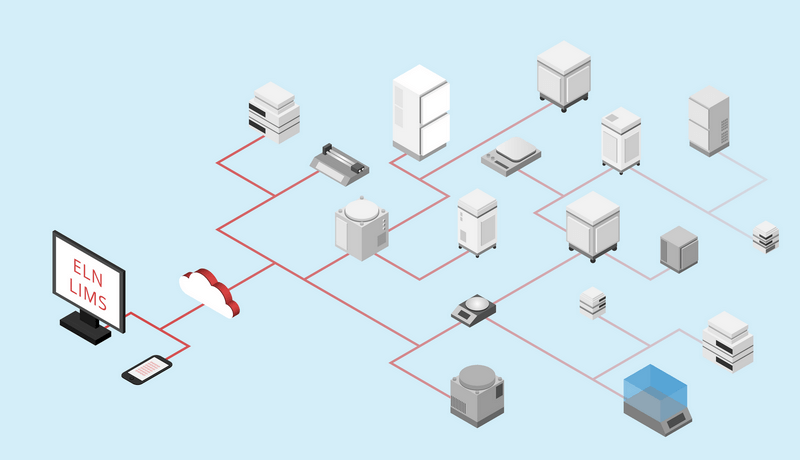We asked students coming from different fields of research what they imagine will happen with laboratories in the future and if they think the Internet of Things (IoT) and cloud based solutions will become must-haves for Life Sciences Laboratories. We have gathered some interesting insights from the minds of young generation. Let see what they’ve told us.
How will a laboratory look like in the future? Will our way of working in a lab change a lot?
Laboratories will definitely be more automatized, where lab machines and instruments will ease researchers’ work by doing it for them. Machines will also be able to predict which step of an experiment the researchers have to do next in order to carry through the experiment and to get valid results. Because of the amount of data we produce high-throughput analysis, which will become more extensive and faster to analyze those large amounts of data.
Paper documenting is always the most haunting part of the research work.
Will software solutions or more specifically cloud based software solutions become more important for the Life Sciences Laboratories?
 It could be as important as paper or even more because the growing amount of data will exceed the capacity of paper. Therefore, you can save a lot of paper, besides that paper documenting is always the most haunting part of the research work. You can also share or export the data much quicker with a help of cloud based software, which is another advantage. This way online data reproducibility is more automatic and simple.
It could be as important as paper or even more because the growing amount of data will exceed the capacity of paper. Therefore, you can save a lot of paper, besides that paper documenting is always the most haunting part of the research work. You can also share or export the data much quicker with a help of cloud based software, which is another advantage. This way online data reproducibility is more automatic and simple.
What is your opinion on producing and sharing the data with a help of cloud based technology?
Nowadays every laboratory has a specific software to read out and upload the data. Producing the scientific data should be standardized with the usage of the same laboratory software amongst scientists. Therefore, they can easily collaborate on the same projects and share the data. Furthermore, you avoid the repetition of the experiments that have already been done and can follow the progress of your team.
Cloud computing and bioinformatics are most certainly the future of science.
Since scientific data doubles each year, is it relevant to assume that research work will have to "go digital" more than ever and why so?
Cloud computing and bioinformatics are most certainly the future of science. Many students are already attending courses in bioinformatics and a lot of professors at universities are thinking to include usage of Electronic Lab Notebook (ELN) into the curriculum. The knowledge of the cloud computing is basically inevitable and the need for knowledge of bioinformatics won’t go away, such as the Internet won’t go away.
and bioinformatics are most certainly the future of science. Many students are already attending courses in bioinformatics and a lot of professors at universities are thinking to include usage of Electronic Lab Notebook (ELN) into the curriculum. The knowledge of the cloud computing is basically inevitable and the need for knowledge of bioinformatics won’t go away, such as the Internet won’t go away.
IT experts will be needed at research institutions and they will work with researchers very closely.
Can you image yourself in the future working in a lab without an Information technology (IT) department or without having some kind of programming skills on your own?
We live in a time of computers, in so-called digital era, that is why it is almost impossible to imagine the future lab without an IT department. However, the programming skills won’t become a necessity for the researcher, instead the IT experts will be needed at research institutions and they will work with researchers very closely. A programming engineer knows how to develop and maintain the software of lab machines and instruments, so they can facilitate the work of scientists and automatically generate the data output. On the other hand, a life scientist brings in the scientific knowledge, which helps him to interpret the data and to make a conclusion about the results.
Without the Information technology Life Sciences won’t be as much competitive or competitive at all.
Do you think that a bridge between BIO and IT sectors is beneficial for a research work in the field of Life Sciences?
As scientists like to say, it depends. The BIO and IT sectors can exist without each other but when you want to survive on such large market as for exp. Laboratory automation, you should use more synergetic approach. This way a company can be (more) competitive amongst the concurrence. Without the Information technology Life Sciences won’t be as much competitive or competitive at all.
Why would you consider working for a BIO-IT company?
Because of the good resources, since the Industry is better founded than the universities. Hence, you can work in a lab with better conditions as a result of having better equipment. You can also expand your knowledge because of other experts you are working with. Work in a company can sometimes be better defined and organized than at university or research institute, so you don’t take work home as much.
Thank you all the interviewees for your participation. Splice whishes you good luck with your future plans.
By Blazka Orel, MSc
[tw_callout size="waves-shortcode" text="" callout_style="style2" thumb="" btn_text="Republish the article" color="#37a0d9" btn_url="https://scinote.net/blog/republish/" btn_target="_blank"]




